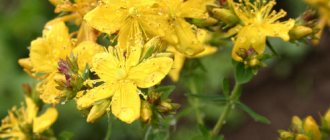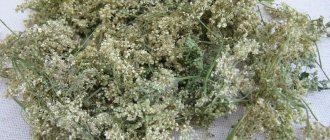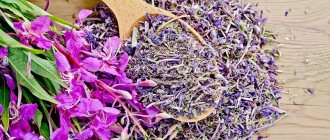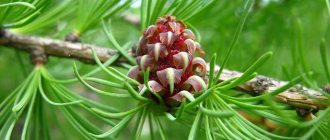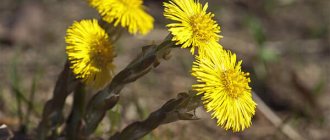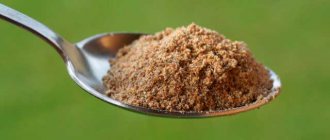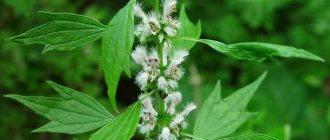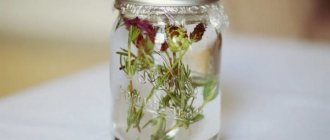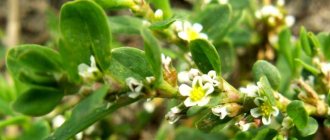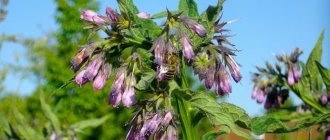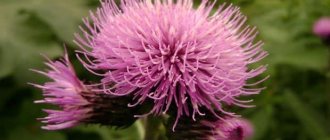The soul will sing and the body will become healthier if you learn how to brew tea from St. John's wort. A healing decoction strengthens the immune system and nervous system, helps rejuvenate the body and normalize hormonal levels. “Good blood” will sparkle in your veins if you take St. John’s wort correctly, wisely using its medicinal properties for comprehensive health improvement.
What are the benefits of St. John's wort?
This is a real natural concentrate of medicinal substances. St. John's wort contains:
- flavonoids
- saponins;
- phytoncides;
- tannins;
- resins;
- essential oils;
- nicotinic, ascorbic acids, tocopherol, carotene and other vitamins;
- iron, magnesium, potassium, sulfur, copper, zinc, phosphorus.
The complex of biologically active compounds in it is ideal for the treatment of various pathologies. St. John's wort is effective against diseases of the heart, reproductive system, biliary and urinary tracts, gastrointestinal tract, and nervous system. Its components have antimicrobial, antirheumatic, diaphoretic, anthelmintic, analgesic effects, relieve inflammation, fever, swelling, accelerate the healing of damaged mucous membranes and skin, and strengthen the immune system.
Drink St. John's wort tea for good health!
Tea with St. John's wort is a herbal elixir of health. In Rus', it was believed that the plant was able to ward off evil spirits, since it grew from a torn feather and drops of the Firebird’s blood. Medieval healers prescribed a decoction of St. John's wort inflorescences to patients suffering from a severe form of melancholy - mental suffering caused by physiological reasons became less intense. And steppe healers used the fresh juice of the plant to treat purulent wounds and made disinfecting compresses from the leaves.
Fans of herbal teas know that St. John's wort forms the basis of many medicinal infusions, which allows them to take the plant without having to study its properties in detail. However, herbal teas not only bring benefits, but can also have contraindications. You should not drink a drink that you are not 100% sure is harmless.
The benefits of St. John's wort drinks
You can safely take St. John's wort in moderate doses in the absence of individual intolerance. Only a fresh decoction is used - the correct infusion should have a slightly noticeable bitterness, which will completely cover the taste of other herbs in the collection. In its “pure form,” the drink is taken in small portions, diluted with water to avoid excessive strength.
The medicinal benefits of the plant are determined by its impressive composition:
- essential oils (hypericin), carotene and tannins;
- flavonoids (natural antioxidant, antimicrobial agent);
- acids (ascorbic, nicotinic, isovaleric);
- vitamins (groups C, P and PP), tocopherols (vitamin E) and choline (vitamin B4);
- ceryl alcohol and alkaloids.
St. John's wort tea relieves a lot of problems if taken in moderate doses for about two to three weeks. When treating chronic diseases, after a week's break and agreement with the doctor, the course is repeated. Sensitive people prone to allergies should reduce the daily dose to 1 cup of weak brew.
What does St. John's wort save from?
- Natural antidepressant. The benefits of St. John's wort are especially noticeable in cases of neuroses, chronic fatigue or depressive disorders. You cannot find a more positive tea; it is usually taken in crisis situations. The dosage is increased to 5 cups per day, reducing the course to a week. The medicine prevents mental exhaustion and calms the nervous system.
- Hormonal control. Young girls can take St. John's wort a week before the expected start of menstruation - the plant reduces pain, reduces the intensity of hormonal fluctuations, and helps normalize the cycle. St. John's wort is no less useful for women experiencing menopause. Slavic sorceresses called it “bloodberry” or “red grass,” advising taking a balanced (in equal proportions) herbal decoction of lemon balm, St. John’s wort and hops.
- Mental activity. School-age children and men engaged in intellectual work should take St. John's wort in the morning (diluted in half with lemon balm). The magical properties of tea will improve concentration, relieve mental stress, and help you think clearly. If you sweeten the drink with honey, it will be a pleasure to drink!
- Normalization of pressure. For men and women holding responsible positions, St. John's wort helps cope with headaches caused by stress (by normalizing intracranial pressure). If dizziness or migraines occur due to overwork, it is worth drinking healthy decoctions of St. John's wort, chamomile and mint during stressful periods.
- First aid for digestion. Tangible benefits from taking St. John's wort are observed for gastritis, ulcers and high acidity. Being a mild antioxidant, the plant improves the functioning of the entire digestive system, removes toxins from the body and reduces pain symptoms. Its medicinal properties make it possible to use it in diets - the plant improves metabolic processes, which promotes weight loss.
- Colds. The antibacterial properties of St. John's wort make it possible to successfully use it to treat otitis, rhinitis, cough and sore throat. There will be no trace of a cold if you use herbal decoctions (externally and internally) at the first symptoms. The benefits of St. John's wort tea for children of high school age are invaluable - the decoctions perfectly strengthen the immune system and make it easier to survive flu epidemics.
- Dental problems. In dentistry, St. John's wort tea is taken as a supportive agent in the treatment of stomatitis and periodontitis. A strong brew of the plant is used to rinse the mouth to relieve inflammation and reduce pain.
The benefits of such tea are obvious, but you need to take it correctly - keeping a moderate dosage, wisely combining it with other medicinal plants.
How to dry St. John's wort
It is recommended to harvest raw materials that grow far from industrial zones and roads. It is advisable to do this in sunny weather, when there is no excess moisture on the surface of the plants. Cut St. John's wort should be hung in small bunches in a shaded, ventilated place or laid out on a wire grid for 2-3 weeks. Moldy or wilted parts should be thrown away immediately. The finished collection is also stored in bundles or fabric bags.
If the environmental situation is not conducive to collecting medicinal herbs, it is best to use pharmaceutical raw materials. St. John's wort herbal preparations:
- dried grass in bulk, packed in cardboard boxes of 100 g;
- filter bags for brewing with crushed raw materials.
Product labels usually indicate the main indications, recipes and features of the use of the plant.
Brewing rules
No matter what beneficial properties St. John's wort has, it should not be taken in large quantities; an overdose can adversely affect your health and you can get poisoned.
The simplest and most commonly used method is tea. Pour one tablespoon of St. John's wort herb into one glass of boiling water, leave to steep for 30 minutes, strain. It turns out a concentrated drink, dilute it 2-3 times, add honey if desired and drink. The healthiest tea is freshly prepared; it cannot be left in reserve; the longer it sits, the less beneficial substances remain.
How to use St. John's wort
The leaves, stems and flowers of the plant are used to prepare water decoctions, alcohol and oil infusions, and its extracts are added to cosmetic preparations and dietary supplements. The pulp of brewed herbs is used for compresses, lotions and masks.
Treatment with St. John's wort can be external, local or systemic. Medicines based on it are taken orally, treated with them on the affected areas of the body, used for rinsing the throat, mouth, eyes, preparing baths and rubbing.
Depending on the purpose and formulation, the herb is crushed as much as possible before use, combined with other ingredients, or used in its natural form.
Features of application in cosmetology
St. John's wort is effective against most cosmetic problems. It helps with skin defects, fungal infections, dandruff, hair loss.
How to use the decoction:
- For dandruff, seborrheic dermatitis, for hair growth - rinse your hair 3-4 times a week after washing your hair.
- Baldness – rub into hair roots an hour before washing your hair.
- Acne, oily facial skin - morning and evening, wipe your washed face with cotton pads soaked in the broth.
- Cracks on the feet, onychomycosis at the recovery stage - do foot baths for 15 minutes every evening before bed.
- Peeling of the skin - lubricate the affected areas with a decoction or ointment of St. John's wort.
- Wrinkles, aging skin - use a decoction to dilute cosmetic clay to enhance its effect.
To enhance the external effect of the decoction, you can drink 100-150 ml once a day. drink When treating cosmetic problems in the summer, care must be taken not to provoke photosensitivity.
For what diseases is St. John's wort useful?
Treatment with St. John's wort preparations is indicated:
- with acalculous cholecystitis, gallbladder dyskinesia, liver dysfunction;
- intestinal disorders, bloating, flatulence;
- gynecological problems, infertility;
- infectious pathologies of the respiratory organs;
- increased anxiety, depression, insomnia.
For the above conditions, the plant is combined with other types of treatment, using drugs from it orally.
For tonsillitis, tonsillitis, stomatitis, gingivitis, caries and other inflammations in the oral cavity, regular rinsing with St. John's wort decoction is recommended.
For dermatitis, eczema, boils, weeping wounds and St. John's wort ulcers, the affected areas are washed, applications and lotions are made.
Efficiency of use
The properties of St. John's wort decoction, benefits and contraindications have been fully studied, so the effectiveness of the plant is not in doubt. Dry powder and extract of St. John's wort are used in traditional medicine to create preparations for internal and external use.
The effectiveness and safety of St. John's wort has been clinically proven. Trials were conducted to compare side effects from taking a decoction of the plant and antidepressants. The results are encouraging - St. John's wort is no less effective, but much less likely to cause unwanted side reactions.
Side effects
The instructions for use of St. John's wort warn about the interaction of the components contained in the herb with antihistamines, analgesics, and cardiac drugs. When taken simultaneously, the risk of side effects increases. The herb extract induces enzymes responsible for the metabolism of a number of drugs and reduces their concentration in the blood plasma. Check with your doctor first about the compatibility of St. John's wort with other tablets.
In case of overdose or prolonged use, nausea, dryness of the oral mucosa, digestive disorders, stool disorders, and stomach pain are noted. In some cases, increased sensitivity to sunlight and anemia caused by iron deficiency develop. Allergic reactions manifest themselves in the form of skin rashes, redness, and itching.
During the course of treatment, it is prohibited to drink drinks containing alcohol. Concomitant use with other antidepressants is not recommended.
Urolithiasis, cystitis
To treat diseases associated with impaired renal function, the anti-inflammatory, hemostatic, astringent, and diuretic properties of St. John's wort are used.
Urolithiasis disease . Acid-base imbalance is a common cause of kidney stones. My stomach hurts, I often want to go to the toilet, my temperature is elevated, I feel nauseous.
After consultation with a doctor, to prevent the formation and dissolution of stones, treat with St. John's wort infusion:
- Brew a glass of boiling water 1 tbsp. herbs, infuse, strain.
Take a third of a glass during the day.
Cystitis (inflammation of the bladder) is accompanied by pain when urinating. Tests are necessary to determine the nature of the infection.
After consulting with a doctor, treat the disease with herbal infusion:
- Stir 3 tbsp. chamomile, 4 tsp. oregano, 4 tsp. knotweed, 8 tsp. St. John's wort.
- Brew 4 tbsp liter of boiling water. mixture, leave for 12 hours, strain.
Take half a glass an hour after meals.
The study and evaluation of histological and biochemical results confirmed that St. John's wort protects against acute renal ischemia.
Chemical composition of a medicinal plant
Before you begin to study St. John's wort decoction, you should understand its chemical composition.
St. John's wort has been well studied and is therefore widely used to combat various ailments. The active components can be found in all parts of the plant, but the root is not used in therapy.
For the production of medicinal products, excellent quality St. John's wort is required, which on average contains 0.1-0.15% hypericin. This active component is found exclusively in the flowers of the plant. In addition, 2-4% of the composition contains bioflavones and flavonoids, which are also necessary for the effectiveness of therapy for a particular disease. Hyperforin and adhyperforin are contained up to 2% in flowers and up to 4% in fruits. They have an antibacterial effect.
Another component is spathulenol. It is contained up to 7.2% in essential oils of medicinal plants.
Treatment of neuroses, depression, nervous disorders with herbal mixture
In case of serious dysfunctions of the nerve system, it is recommended to enhance the work of St. John's wort with additional herbal components. The herbal collection has a wide range of effects - it calms, strengthens the nerves, relieves irritability, promotes sound healthy sleep, and treats neuroses.
It is also recommended to use home-prepared medicine for vegetative-vascular dystonia. To prepare homemade medicine, it is recommended to use a combination of herbs:
- valerian (roots);
- peppermint (leaves);
- St. John's wort (herb);
- hops (cones);
- lemon balm (leaves).
Take the herbal ingredients equally; to prepare a homemade sedative you will need 20 grams. herbal collection. Steam the healing mixture with a glass of boiling water and leave for half an hour. Strain using gauze folded in several layers.
Drink the herbal medicine in small (only 20-25 ml) portions throughout the day. The duration of treatment is one and a half months. If the problem cannot be completely eliminated, continue the course after taking a break (7-10 days).
During drug therapy prescribed by a specialist, it is prohibited to simultaneously take pharmaceutical drugs or herbal compositions. It is necessary to observe an interval between medications - 1-2 hours.
Against anxiety and stress
Modern life is filled with numerous anxieties and worries, which are not so easy to cope with. Work, family, friends - it’s difficult to pay attention to everyone at once. Such workload greatly affects our mood. We feel too tired and anxious. St. John's wort can help cope with such conditions. Drink tea from this plant in the evening after a hard day to feel calmer. This drink helps relieve anxiety and improves sleep quality. Scientists believe that this effect occurs due to flavonoids. Also, the substances contained in the plant can normalize hormonal levels. That is why St. John's wort is recommended for women to drink.
Robert Downey Jr: 'I'm eternally grateful for 10 years of playing Iron Man'
New Year in Wuhan, Sydney, Melbourne, Vladivostok: festive streets
“I didn’t write for a large audience”: Kivinov told why the series “shot”
Drink St. John's wort every day and you will feel your thoughts clearer and your brain cleared of negativity. Irritability and anxiety will go away, and calm and tranquility will take their place. Moreover, St. John's wort can quickly help with panic attacks.
Preparation of alcohol tincture
The alcohol tincture is very convenient to use; you can prepare it yourself. You will need to take dry St. John's wort herb and pour it with alcohol in a ratio of 1:7. If vodka is used, a ratio of 1:10 is suitable. The tincture must be kept in the dark for three days.
Then the mixture is filtered, the tincture is poured into a dark container. An alcohol tincture is used for warming compresses and treating depressive conditions. 1 teaspoon of tincture is diluted in a quarter glass of water. For warming compresses, there is no need to dilute the tincture. To get rid of depression, you need to drink St. John's wort 10 drops of tincture diluted in water three times a day. The course is a month.
What do you need to remember?
To prevent traditional treatment from ending in unpleasant surprises in the form of side effects or lack of results, it is recommended to remember a few rules to avoid problems. Basic requirements for successful recovery from diseases of the nervous system:
- It is recommended to use only St. John's wort in treatment - other types of herbs do not differ in healing qualities;
- before starting the course, familiarize yourself with contraindications - the presence of prohibitions should be the reason for refusing to use home remedies, otherwise it is easy to cause serious complications;
- consultation with a specialist is an indispensable condition for successful treatment; without the doctor’s permission, consuming even weakly saturated decoctions or infusions is strictly prohibited;
- remember the toxicity of the herb - only the correct use of herbal remedies will provide positive results;
- After the first doses, carefully monitor the body’s reaction - if you are individually intolerant to the herb, you will have to stop taking it;
- When preparing herbal formulations, strictly follow the recipe - adding additional components; exceeding the specified amount of the active ingredient is not recommended.
In folk treatment using St. John's wort, it is also important to observe the duration of the course. It is recommended to allow the body to rest by maintaining intervals.
St. John's wort is a plant famous for its many healing qualities, which alternative medicine offers to address health problems.
Herbal remedies have a positive effect on all diseases of the nervous system, while simultaneously having an additional effect on all human systems and organs.
It should be remembered that in case of serious depression, the effectiveness of herbal medicine will not be enough to cope with the disease - with the permission of a specialist, it is better to use the herb as an auxiliary therapy.
